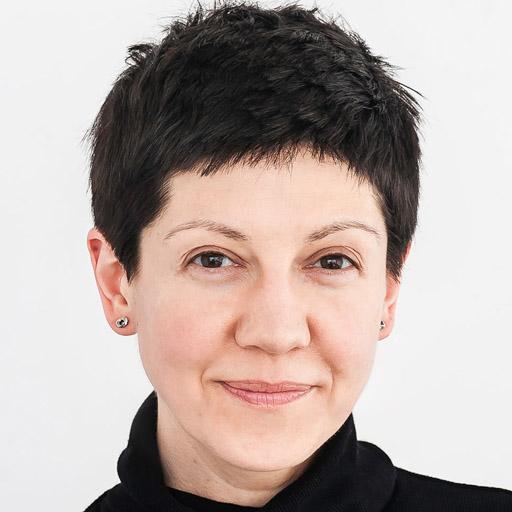
Elena Razlogova
- Associate Professor, History
Are you the profile owner?
Sign in to editContact information
Email:
Website:
Biography
Elena Razlogova is an Associate Professor of History at Concordia University. She is the author of The Listener's Voice: Early Radio and the American Public (University of Pennsylvania Press, 2011) and co-editor of “Radical Histories in Digital Culture” issue of the Radical History Review (2013). She has published articles in American Quarterly, Radical History Review, Russian Review, Journal of Cinema and Media Studies, Radio Journal: International Studies in Broadcast & Audio Media, Cultural Studies, Social Media Society, Studies in European Cinema, SubStance, Black Camera, and several edited collections. Her work has appeared in Russian, Italian, and Czech as well as English. Her research interests include U.S. radio history; music recommendation, recognition, and mastering algorithms; the Global Cold War; film translation; Global South cinema networks; and Soviet international film festivals.
Education
B.A. University of California at Berkeley, M.A. New York University, Ph.D. George Mason University
Teaching activities
Fall 2025
HIST 498/670 - Seminar: 498B/670B Student Protest in North America and the World
Winter 2026
HIST 329 - Music in History
Publications
Book
The Listener’s Voice: Early Radio and the American Public (Philadelphia: University of Pennsylvania Press, 2011).
Articles and Chapters: Algorithms/Music/Radio
“Freeform Radio and the History of Music Streaming.” Preprint. Forthcoming in The Oxford Handbook of Radio Studies, edited by Michele Hilmes and Andrew Bottomley (New York: Oxford University Press, 2023).– about WFMU’s early experiments in “streaming” music via telephone, gopher, and the web.
with Jonathan Sterne, "Tuning Sound for Infrastructures: Artificial Intelligence, Automation, and the Cultural Politics of Audio Mastering," Special Issue "Infrastructural Politics," Cultural Studies 35, no. 4-5 (2021): 750-770.
"Provincializing Spotify: Radio, Algorithms and Conviviality,” Radio Journal: International Studies in Broadcast & Audio Media, 18, no. 1 (2020): 29-42. - about WFMU and Free Music Archive
(with Jonathan Sterne) “Machine Learning in Context, or Learning from LANDR: Artificial Intelligence and the Platformization of Music Mastering,” Social Media and Society 5, no. 2 (2019): 1-18.
“Shazam: The Blind Spots of Algorithmic Music Recognition and Recommendation,” in Appified: Culture in the Age of Apps, ed. Jeremy Morris and Sarah Murray (Ann Arbor: Michigan University Press, 2018), 257-266.
“The Past and Future of Music Listening: Between Freeform DJs and Recommendation Algorithms,” Radio’s New Wave, ed. Michele Hilmes and Jason Loviglio (New York: Routledge, 2013) - about WFMU’s relationship with music recommendation apps.
Articles and Chapters: Film/Cold War/Decolonization
“Paulin Soumanou Vieyra, the Soviet Union, and Cold War Circuits for African Cinema, 1958–1978,” Black Camera 13, no. 2 (2022): 451–73.
“On Soviet Spoken Cinema,” in Remapping Cold War Media: Institutions, Infrastructures, Networks, Exchanges, ed. Alice Lovejoy and Mari Pajala (Bloomington: Indiana University Press, 2022), 157–75.
“Ascesa e caduta della diplomazia sino-sovietica dei festival cinematografici, 1957-1966 [The Rise and Fall of Sino-Soviet Film Festival Diplomacy, 1957-1966],” trans. Francesco Pitassio, Cinema e Storia: Rivista di studi interdisciplinari 10 (2021): 87–103. In Italian. English original appended at the end.
“An Air Map for World Cinema: Aeroflot as an Infrastructure for Cinematic Internationalism,” Special Issue "The Union of What? Soviet Internationalism Thirty Years after the Fall of the USSR," Russian Review 80, no. 4 (2021): 661–80.
“Cinema in the Spirit of Bandung: The Afro-Asian Film Festival Circuit, 1957-1964,” in The Cultural Cold War and the Global South: Sites of Contest and Communitas, ed. Kerry Bystrom, Monica Popescu, and Katherine Zien (London: Routledge, 2021).
“The Liberation Politics of Live Translation: Global South Cinemas in Soviet Tashkent,” JCMS: Journal of Cinema and Media Studies 59, no. 4 (2020): 183–88.
“World Cinema at Soviet Festivals: Cultural Diplomacy and Personal Ties,” Studies in European Cinema 17, no. 2 (2020): 140–154.
“The Politics of Translation at Soviet Film Festivals during the Cold War.” SubStance 44, no. 2 (2015): 66–87.
“Listening to the Inaudible Foreign: Simultaneous Translators and Soviet Experience of Foreign Cinema,” Sound, Music, Speech in Soviet and Post-Soviet Cinema, ed. Lilya Kaganovsky and Masha Salazkina (Bloomington: Indiana University Press, 2014).
Articles and Chapters: Other
(co-authored with Lyell Davies) “Framing the Contested History of Digital Culture,” Radical History Review, no. 117 (Fall 2013): 5–31.
“True Crime Radio and Listener Disenchantment with Network Broadcasting, 1935-1946,” American Quarterly (March 2006).
“DIY Image Management with Zotero,” Perspectives on History, October 2012.

